Anne of the Wild and Sea
Not many little girls who love animals grow up to be animal trainers in films, but as Jet Metier found out about Anne Gordon de Barrigón, that was one of her earlier steps to do what she really wanted to do: swim with dolphins and whales as a way of life. And along the way she married a man from a native Panamanian tribe and opened a B & B on Contadora Island that offers studies for those interested in spiritually connecting with dolphins and whales..jpg)
.jpg)
This interview is spread over four parts because Anne shared so many great details of her odyssey with land and marine animals.
Jet: Hi Anne. How are you? You said that you just got back. Where have you been?
Anne: I was out on Contadora Island in The Pearl Islands.
Jet: Are you always away for four days?
Anne: No actually, I was training staff who are running our Contadora Island Tours, so I don’t have to be out there constantly.
Jet: You kind of blew my bubble. I thought you were a “one-man band.”
Anne: It’s gotten too big for a one-man band. The one-man band needs to be about 16 people these days.
Jet: Good for you! I am all for entrepreneurship. Who are these people on your staff? Are they young kids from a biology program or something like that?
Anne: There is a young adult married couple who have experience managing B&B’s and eco resorts. They love Panama. They love Contadora Island, and so it seemed like a good fit. They are out there and they are doing gangbusters already.
Jet: Contadora Island; is this a place that has running water and electricity and everything like that?
This is not one of those places where they hand you a shovel and say, “First you must dig your own latrine,” is it?
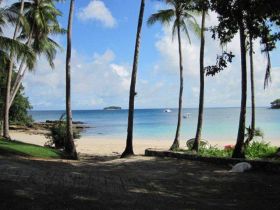
Anne: No, there are nice hotels there. But the Internet is kind of spotty, so when I am training them or doing tours out on the boat, I don’t have time for much else.
Jet: You spent Valentine’s Day away from your husband.
Anne: Well, it doesn’t mean anything in the native, tribal Emberá culture, so there is no Valentine’s Day in their culture. The Emberás don’t even have a word for “year.”
Jet: So how do they note the passage of time?
Anne: They don’t. They just go from day to day to day.
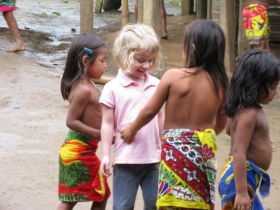
Jet: Are they curious about the culture that you came from? And having seen couples lovey-dovey during this weekend because of Valentine’s Day, do they have that kind of interest?
Anne: Well, they are very, very curious about the outside world. Absolutely. But as far as seeing couples lovey-dovey, they aren’t going to see that out in the jungle. That’s not something you are going to see in Panama City either. Not a lot of PDA’s [public displays of affection].
Jet: So how do you feel about that? You’re Canadian, right?
Anne: No, I’m US.
Jet: Your US? And you have that “eh?” accent? [Laughing] Do people think you are Canadian, Anne?
Anne: All the time. I’ve spent a lot of time in Canada. Or I get asked if I am from Minnesota or North Dakota. No, it’s Canada’s influence.
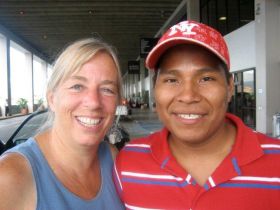
Jet: So about your husband. Did you say, “Honey, let’s stroll hand in hand when we are in Panama City.”
Anne: No, he’s not really into that. Relationships are all about compromises. That’s not a big deal to me, one way or another. So, as long as I am comfortable at home in the affection I am receiving, it doesn’t matter what I receive in public.
Jet: So let’s go back to the animals. I was teasing you about putting the dolphins to bed and so forth in my emails. Why dolphins, why whales? When you were a kid, did your mother put you to sleep with stuffed dolphins and whales instead of a stuffed bear?
Anne: No, I wish. I did have a bear. No, its just something that came to me. I’ve always loved animals. I grew up with an affinity with animals. My first spoken word was “doggy.”

Jet: Yea!
Anne: I grew up on my dad’s boat, and we were always watching orca whales as a kid. And I worked as a zookeeper; training animals for movies for many, many years. And then, about, I’d say, 2000, 1999, something like that, I started feeling “the call.” I just felt this longing to spend more time with dolphins.
Jet: What do you mean by “the call?”
Anne: I just wanted to spend more time with dolphins. I wanted to swim with them. I wanted to learn more about them. I wanted to read more books.
Jet: What did you read that influenced you, that you could do this as a living? Or did you need someone to tell you that I could do this and make a life?
Anne: Nothing, it all kind of fell into place. I was working in the film industry, training animals for film.
Jet: In Hollywood or Vancouver?
Anne: In the Seattle area, but I’ve worked in both Hollywood and Vancouver. All of the above.
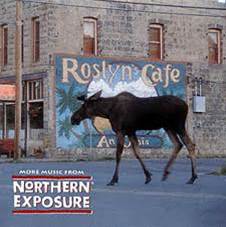
Jet: What kind of animal trainer were you? Who have you worked with? Who were your charges? Any celebrity animals I would know? [Laughs] Let’s name drop here.
Anne: Okay, how about Sassy from Homeward Bound? Worked a little around Bart the Bear. I trained Buddy from Air Bud.
Jet: Who was Bart the Bear?
Anne: Bart the Bear was in Legends of the Fall and The Bear, that movie. Also the new Benji, I trained.
Jet: Okay, those are dogs and bears.
Anne: No, no, no, those are just the famous ones. I have also worked with big cats and chimpanzees, and wolves, and the deer in the remake of The Yearling. I did all the animals for Northern Exposure, that TV series, including the moose.
Jet: How cool! [Jet making swooning sounds]
Anne: So that’s a lot.
Jet: Anne, that’s tremendous! Do you have a fan club?
Anne: [Laughing]
Jet: I can just imagine those who admire you, and would love to sit at your knee at hear your stories. I can think of people now around the world, who love those movies, and would love to know more about the animals.
A lot of these animals are dangerous. How did you lose your fear of them or do you just have this tremendous respect?
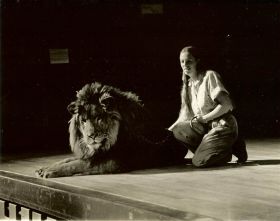
Anne: It’s the respect. It’s knowledge. Knowledge is first; knowing how to behave around them; knowing how to train them; how to work with them. And the utmost respect, not expecting them to be a golden retriever, but expecting them to be a lion or a tiger or whatever, and working within those boundaries of that given species. So you have to know how to behave. You don’t have a fear, but you have to have a very healthy respect and understanding.
Jet: You certainly are an anomaly, because most people, if they were in the vicinity of those larger animals, would freak out.
What happened in your life, when you said, “No, I can communicate with them. I can have a relationship with them. We can have a relationship.” Was there a point? Was there something that happened?
Anne: No, I think it was something I was born with. I always, always had an affinity with animals. So I don’t think there was one specific point or anything changed. And when you are working with the big cats, like a tiger, basically you get them as a little baby, and you raise them up, and they think of you as momma. So there’s an instant respect, so that respect from when they are ten pounds, as long as you behave and maintain the rules and domination through gentle respect, they’ll treat you the same way when they are 500 pounds.
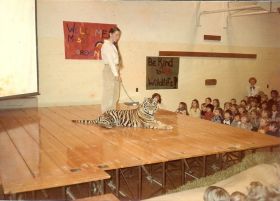
Jet: Anne, if we were to do a movie about your life, give me two of the points, say high points, with all the animals in your life. Let’s take you on the boat with your dad, and let’s take you with the orcas. Let’s do a scene there that shows that these are just more than just prancing animals off the side of the boat; where something happened between you and the animals, a communication…
Anne: There is a sense of joy that you feel when you are in the presence of a dolphin or a whale; just this sense of awe; of natural raw beauty; of joy you feel within yourself. And another real gift of spending time with whales and dolphins is that when you are with them in that moment, it is impossible to think about anything else, like your worries, and your stresses, and your bills back home, or whatever; your problems. You are in the exact present moment of now, which as humans, we are not very good at, but something we need to be better at. And that’s a huge gift that the whales and dolphins give to us.
Jet: For you, was this a skill you developed or did you train yourself to be that focused?
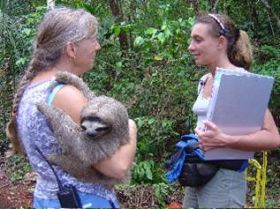
Anne: I was born with an affinity for animals. I always felt safest, most at ease with animals over human beings for many, many years. So it was only natural for me to spend time with them. But the whale and dolphin connection is something that has been developed.
I went to a school in Arizona that taught us a kind of spiritual aspect. They taught me how to connect and tune in and communicate as it were with them on that level.
Jet: Where in Arizona was this?
Anne: The class was held over six different weekends over a year and a half period. We were in Phoenix part of it and in Sedona for part of it. The teachers live in the Sedona area. It’s called Dolphin Heart World.
Jet: Did you have to apply with credentials? Or could anyone take these lessons?
Anne: Anyone could take these lessons; anyone with the right interest levels.
Jet: It’s so funny because it is in landlocked Arizona.
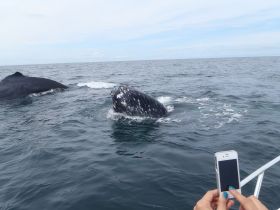
Anne: It’s all about the spiritual connection, so you don’t need to be with the physical dolphins to learn about the spiritual side of them.
Jet: A lot of women, I think have an affinity with dolphins and whales. They really want to be with them. And when I told this woman the other day what you did, I think it just blew her away, because she has this dream, too, but you are living that reality. How do coax women to do what you do and how would they go about it? This particular woman is in landlocked Phoenix. How would someone be on the level you are and have a relationship with orcas and dolphins?
Anne: Well, it is very simple. I can say it in three words.
Jet: Okay, I’m counting.
.JPG)
Anne: Follow your heart. If you are working at a day-to-day office job, and your passion is to be out there on the ocean swimming or working around dolphins and whales, there’s a way to do that. Just write to somebody. Be an intern. Be a volunteer. Or go take a vacation that does that and talk to them and ask them, “How do I get involved with this?”
It’s not for everybody and it’s not as idyllic as it seems. As is the case with any job, it certainly has its stresses and “moments.” But, yes, when you are out there in the water swimming with the dolphins, all those moments do disappear, and it’s fabulous.
Jet: I can see that. Have young people come up to you with those questions? And have you been able to help anybody as you are advising them now?
Anne: Well, not specifically about the dolphins and whales, but when I trained animals for films, I did some school outreach programs, and I would get people who wanted to work, like in the film industry with animals ask, how do I get that job?
And I give them the advice I took when I was straight out of university, a biology graduate. And the first thing I did was to volunteer at the local zoo. And by volunteering, that gave me enough of a taste of it, to know that yes, that’s what I wanted to do. And for some it might be enough to say, “No, I don’t want to do that.” Volunteering is an extremely valuable education in the work process.
.jpg)
Jet: And you created your own job, too, ‘cause that’s the next step, because you can volunteer as much as you can, but turning this into a livelihood, especially in the film industry… Did you work for an agency?
Anne: No. Again, it is not something I set out to do, but I kind of end up finding myself in an area where the job I want doesn’t exist. In the Pacific Northwest, when I was training wild animals and taking them out and doing school outreach programs, I realized that there was nobody training animals for the film industry in the Pacific Northwest.
Jet: Go girl! How old were you at this time?
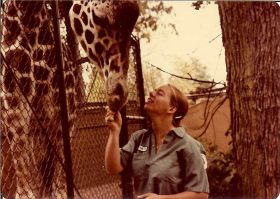
Anne: I was probably around 28, 30. Something like that.
Jet: From then on, how did you make a niche for yourself?
Anne: Well, I started networking with a little Northwest film trade industry group. I went to their meetings, and then I gave a presentation on how to work with animals in film. Then, I got involved with the local industry. I was on the board of directors, and all that goofy stuff. So you put ads in the local trade magazines and such, and off you go.
Jet: You are amazing! Your entrepreneurial spirit is very, very strong. Was your dad self-employed? Was your mom self-employed? How did you know you could actually do this?
Anne: I didn’t know I could actually do this and I can say it was never my goal to own a business or be a businessperson. My goal was just to work with animals. Or spend time with dolphins and whales. And how do I do that without me having to pay to do it every day.
Jet: Yea! [Laughing]
Anne: [Laughing] And this is what you come up with. So when you are doing something that you love and that you’re passionate about, it all just seems to work out. And hopefully that comes through to the people who come on your tour.
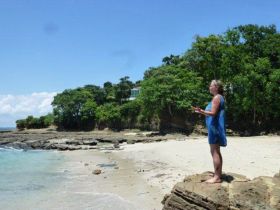
Look for the continuation of Jet’s interview with Anne Gordon de Barrigón on part two of her interview, where Anne tells us what we can learn from dolphins and whales and more about their intimacy (which, as it turns out, isn’t very intimate at all.)


